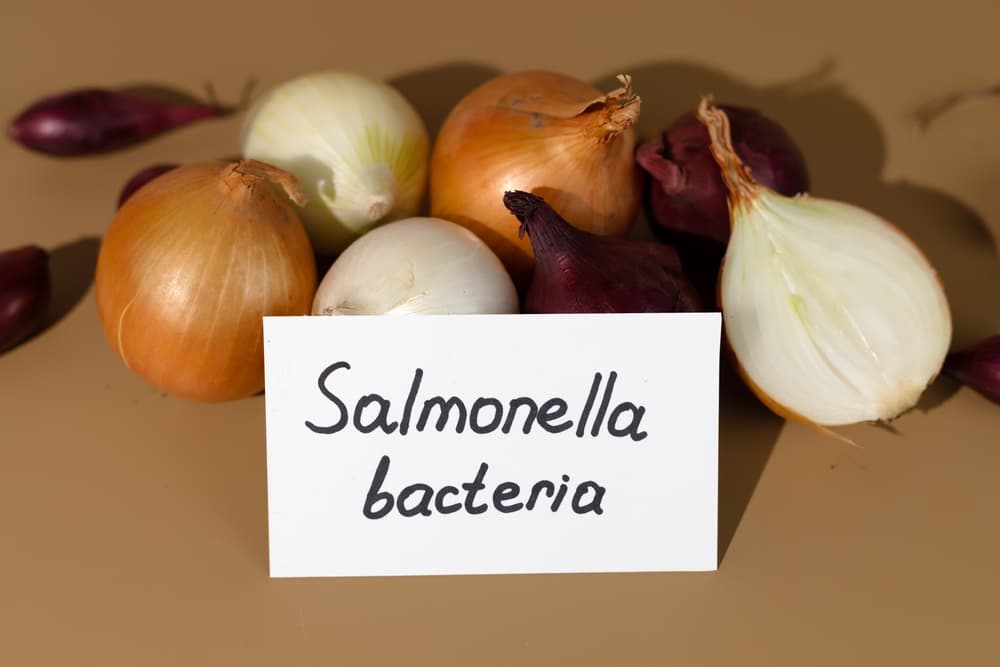According to the Centers for Disease Control (CDC), about 1.35 million people suffer from Salmonella poisoning yearly. About 26,500 people go to the hospital, and 420 die. Most people contract Salmonella from food. Many people recover without treatment and, according to the CDC, should not take antibiotics unless they have a severe case.
If you suffered illness or lost a loved one because of a Salmonella outbreak in food or because someone sold you a small turtle, contact a food poisoning lawyer for a free case evaluation.
Symptoms of Salmonella
In most cases, the symptoms people suffer from Salmonella poisoning include diarrhea, fever and stomach cramps. Diarrhea can sometimes be bloody. If the Salmonella poisoning is more severe, people might suffer from nausea, vomiting, and a headache.
More severe symptoms that warrant a call to your doctor include:
- Fever higher than 102 degrees Fahrenheit.
- Diarrhea that lasts more than three days. You must also be aware of becoming dehydrated when diarrhea lasts longer than 24 hours.
- Prolonged vomiting that will not allow you to keep liquids down.
- Dehydration (dry mouth, dry throat, you make less urine than usual, or you get dizzy when you stand up).
Reducing the Risk of Contracting Salmonella
Always make sure you handle food properly. Keep it chilled to the proper temperature until you are ready to cook it. Keep different types of meat separate from each other. In addition to good food handling practices, you can take other steps to reduce the risk of contracting Salmonella.
Salmonella is not only in fresh foods. And, if the bacteria made its way into the food, you cannot tell since the food smells and looks normal. You can find Salmonella in eggs, frozen foods, vegetables, chicken, fruit, pork, processed foods, and more.
This infection can spread from one person to another and from animals to people. Always wash your hands with soap and water after handling food, using the bathroom, or coming into contact with animals.
During the summer, when many people have cookouts and barbeques, the incidences of Salmonella tend to increase. This is because the warmer weather combined with unrefrigerated foods creates the perfect condition for Salmonella to grow. If the temperature is 90 degrees Fahrenheit or higher, be sure to ice or refrigerate foods after an hour. When temperatures are lower than 90 degrees Fahrenheit, you can leave them out for up to two hours.
Children under 5 or older adults are more likely to contract Salmonella. Those who have diabetes, are getting cancer treatments, or otherwise have a compromised immune system can also contract Salmonella much easier than others.
How to Know if You Have a Salmonella Infection
The only to tell if you have a Salmonella infection is to take a stool or blood sample. If you believe you have a Salmonella infection, you should ask your doctor to take a sample. The lab can check for Salmonella by using a culture that separates the bacteria or using a test that detects the genetic material of the bacteria.
If you do have a Salmonella infection, the lab will report the test results to your doctor and reports it to the state’s public health laboratory. The state lab does further tests on it to determine the strain, then reports the results to the Centers for Disease Control and the PulseNet database.
Recent Salmonella Outbreaks
The CDC tracked reported Salmonella illnesses from food, animals, and “others.” Some of the recent cases include:
SunSprout Enterprises Raw Alfalfa Sprouts
Fifteen illnesses from eating SunSprout Enterprises’ raw alfalfa sprouts resulted in two people going to the hospital and zero deaths across three states. The sprouts were packaged in 4-ounce clamshell containers made of clear plastic and in 2.5-pound packages. The lot numbers are 4211, 5211, 3212, and 4212, with best-by dates from December 10, 2022, and January 7, 2023. The sprouts were sold in Nebraska, Oklahoma, and South Dakota.
Fish by Mariscos Bahia, Inc.
Thirty-nine illnesses resulted in 15 people seeking medical treatment at hospitals across four states. This outbreak did not cause any death among the reported cases. In this case, 18 people reported eating raw fish, poke, or sushi. Ten of them reported they ate raw salmon. Some of the people reported getting sick after eating at a restaurant, and an investigation found the restaurant used fresh fish, including salmon, halibut, Chilean seabass, swordfish, and tuna from Mariscos Bahia, Inc. The outbreak affected people in Arizona, California, Illinois, and Texas.
Jif Peanut Butter
Twenty-one people suffered illnesses after eating Jif peanut butter. Of those, four sought treatment at hospitals across 17 states. The infection affected crunchy, creamy, reduced fat, and natural peanut butter sold by the company. The lot codes were 1274 through 2140, with the last three numbers of 425 (for example, 1274425).
States affected include Arizona, Arkansas, Florida, Georgia, Illinois, Indiana, Massachusetts, Michigan, Missouri, New York, North Carolina, Ohio, South Carolina, Texas, Virginia, Washington, and West Virginia.
Salmonella Outbreaks from Food and Animals in 2021
The following are outbreaks of Salmonella from 2021. While some outbreaks from 2022 and 2023 are still open, investigators resolved the following cases.
Salami Sticks
Thirty-four illnesses attributed to Salmonella resulted in seven hospitalizations and zero deaths across ten states. Citterio brand Premium Italian-Style Salame Sticks with a best-by date through January 23, 2022, were the subject of a recall because of Salmonella. Stores across the nation sold Citterio brand salami sticks. Officials in California found Salmonella in two unopened packages of Citterio brand Premium Italian-Style Salame Sticks.
States affected by Salmonella from eating this brand of salami sticks included California, Illinois, Kansas, Maryland, Michigan, Minnesota, New Jersey, New York, Pennsylvania, and Virginia.
Salmonella in Seafood
Northeast Seafood Products of Denver, Colorado, distributed seafood to grocery stores and restaurants, causing 115 illnesses and 20 hospitalizations over 15 states. The seafood included monkfish, haddock, grouper, bone-in trout, red rock cod, red snapper, Pacific cod, ocean perch, coho salmon, halibut, lane snapper, Atlantic salmon portions, all-natural salmon fillet, tilapia and farm-raised striped bass. People reported that they ate either raw or cooked seafood.
States affected include Arizona, California, Colorado, Connecticut, Iowa, Minnesota, Missouri, Nebraska, New Jersey, Pennsylvania, Texas, Virginia, Washington, and Wisconsin.
Onions
Onions caused 1,040 Salmonella illnesses and 260 hospitalizations over 39 states, the District of Columbia and Puerto Rico. The onions were red, white, and yellow onions imported from Chihuahua, Mexico. People who ate the onions raw contracted Salmonella. Authorities issued a recall of onions distributed by ProSource Produce LLC and Keeler Family Farms. The companies imported the affected onions between July 1, 2021, and August 31, 2021.
States not affected by the outbreak include Montana, Idaho, Wyoming, Nevada, Arizona, Alaska, Maine, Vermont, New Hampshire, Rhode Island, and Delaware.
Italian-Style Meat
Fratelli Beretta brand prepackaged uncured antipasto trays caused 40 Salmonella illnesses and 12 hospitalizations across 17 states. The trays were 24-ounce trays that contained two 12-ounce packages. They had a UPC of 073541305316 and a best-by date of “on or before February 11, 2022.”
States affected include Arizona, California, Colorado, Illinois, Indiana, Maryland, Michigan, Minnesota, Nevada, New York, Ohio, Oregon, Texas, Utah, Virginia, Washington, and Wisconsin.
BrightFarms Packaged Salad Greens
Thirty-one people suffered from Salmonella illnesses from eating BrightFarms packaged salad greens. Of those, hospitals admitted four. The illness covered four states: Wisconsin, Illinois, Michigan, and Pennsylvania.
Frozen Cooked Shrimp Supplied by Avanti Frozen Foods
Nine people suffered Salmonella poisoning, and hospitals admitted three over four states. Frozen cooked shrimp distributed by Avanti Frozen Foods sold under brand names including Censea, 365, Ahold, Chicken of the Sea, Big River, CWNO, Food Lion, First Street, Harbor Banks, Hannaford, Honest Catch, Meijer, HOS, Open Acres, Nature’s Promise, Waterfront Bistro, Sea Cove, Sandbar, Wellsley Farms, and WFNO Brands were the subject of a recall for Salmonella.
While the recall was for June and August of 2021, some might have the shrimp in their freezers. The states affected include Arizona, Michigan, Nevada, and Rhode Island.
Breaded, Pre-Browned, Stuffed Frozen Raw Chicken Products
Several brands of breaded, pre-browned, stuffed frozen raw chicken products caused 36 Salmonella illnesses and 12 hospitalizations over 11 states, including Dutch Farms Chicken with Broccoli & Cheese, with a best-by date of February 24, 2023, and lot code BR 1055; Milford Valley Chicken with Broccoli & Cheese and Milford Valley Chicken Cordon Bleu, both with a lot of code of BR 1055 and a best-by date of February 24, 2023; and Kirkwood Raw Stuffed Chicken, Broccoli & Cheese, and Kirkwood Raw Stuffed Chicken Cordon Bleu with lot codes BR 1055 and BR 1056 respectively. The best-by dates are February 24, 2023, and February 25, 2023, respectively.
Every listed product has the establishment number “P-2375” within the USDA’s inspection mark. States affected include Arizona, Arkansas, Connecticut, Illinois, Indiana, Michigan, Minnesota, Nevada, New York, Ohio, and Oklahoma.
Jule’s Cashew Brie
Salmonella in Jule’s Cashew Brie caused illnesses in 20 people and hospitalized five over four states. The affected states were California, Florida, Maryland, and Tennessee.
Ground Turkey
Four brands/types of ground turkey caused Salmonella illness and four hospitalizations across 14 states. The brands were Nature’s Promise 94 percent lean ground turkey; Wegmans 94 percent lean ground turkey (two sizes, including the family pack); and Plainville Farms ground white turkey. The outbreak affected Arizona, Connecticut, Indiana, Maine, Maryland, Massachusetts, Missouri, New Hampshire, New Jersey, New York, North Carolina, Pennsylvania, Vermont, and Virginia.
Salmonella Outbreak in Animals

Just as with 2022, 2021 saw Salmonella outbreaks caused by pets, including:
- One thousand one hundred thirty-five illnesses and 273 hospitalizations from backyard poultry over 48 states plus the District of Columbia and Puerto Rico
- Twenty-nine illnesses and 14 hospitalizations over 12 states from wild songbirds over 12 states
- Eighty-seven illnesses, 32 hospitalizations, and one death from small turtles in 20 states and the District of Columbia
Wild songbirds made people sick in California, Georgia, Kentucky, Mississippi, Missouri, Nebraska, New Hampshire, Oklahoma, Oregon, Tennessee, Texas, and Washington.
